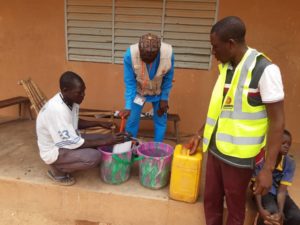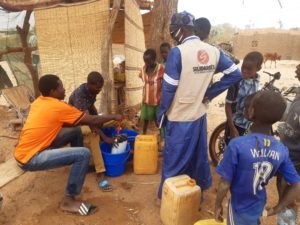Tensions over clean water resources in Djibo
Since 2022, Djibo, capital of the Soum region in Burkina Faso, has been facing an implosion of its Burkinabé population. This is the result of internal conflicts between non-state armed groups (GANE) and government forces.
Unfortunately, this demographic implosion is not without consequences. It has led to a shortage of natural resources, including water. This has led to the umpteenth intervention by Solidarités Internationale in this West African territory. Access to clean water in Djibo has been a complex issue since the start of the conflict.
According to the National Council for Emergency Relief and Rehabilitation (CONASUR), there are 283,428 internally displaced persons and 50,000 resident inhabitants, for a total ratio of 567% displaced persons. In addition, armed groups are restricting access to natural resources.
Sabotage of a generator on the network of the National Water and Sanitation Board (ONEA), which supplied 2/3 of the population with water, deliberate attacks on water infrastructures (2 of the 3 water generators, 6 of the 12 solar-powered abductors), blockade of the town by Djiboutians – the rebels never ceased to bring terror to everyone.
©Solidarités International_Burkina Faso
Unobtrusive deployment in complex situations for access to clean water in Djibo
Faced with the impossibility of carrying out repairs, the inaccessibility of water points, or the impossibility of using emergency water treatment systems due to the risk of vandalism, Solidarités International needed a water treatment solution that was discreet due to its small size, community-based and could be made available at water points and instantaneously for on-demand use.
With these expectations in mind, Solidarités International called on Fonto de vivo to limit the deterioration of the population’s health situation.
To meet these numerous logistical constraints, the NGO decided to purchase 500 ORISA® autonomous water purifiers. In fact, to meet the needs of displaced people: cooking food, giving animals something to drink, maintaining regular hygiene, staying hydrated, etc., this water filtration solution is simple to use, long-lasting and easy to maintain. This easy-to-use, long-lasting and efficient water filtration solution is particularly well-suited to the task. To this end, they have set up a specific program dedicated to the production of healthy water to limit the water-borne diseases that harm the population: trainers, awareness-raising actions, pumping points for day laborers, etc.

©Solidarités International journalists in training

©Water filtration point in Burkina Faso_Solidarités International/ORISA®

©Community distribution point_drinking water
ORISA® purifier for instant healthy water
As Pierre Brunet puts it in his article for Défis humanitaires Humanitarian innovation tested in the field: the example of the Orisa water purifier, “Humanitarian action is made up of commitment and concrete responses, without which it is just words”, and ORISA is part of this approach. This high filtration quality water purifier has been awarded full Protection *** by the WHO as part of its Home Water Treatment Technology Assessment Program
It offers a practical, effective solution for large-scale crisis situations such as Djibo. Ultra-compact, it can be transported less by helicopter than larger infrastructures or chlorine purification solutions.
What’s more, these require time for purification, which daily users can do without thanks to the ORISA® water filter and its manual pumping system, which delivers a water flow rate of up to 180L/hour.
The service life of its membrane, estimated at 20,000 L of filtered water before replacement, demonstrates the profitability and reliability of this equipment in humanitarian situations, both emergency and development.
Interview with Lise Florin in charge of the Burkina Faso program
Lise Florin – Water, sanitation and shelter program coordinator for Solidarités International
Device for producing healthy water for the people of Burkina Faso
This humanitarian program is a perfect example of the problems faced by many populations, namely famine and the lack of drinking water, which undoubtedly leads to water-borne diseases. By water-borne diseases, we mean illnesses caused by drinking water of poor quality and dubious origin. Hepatitis E, for example, is a benign disease in most cases, but often gives rise to serious complications. These can cause death in people without access to good food and, above all, clean water. Cholera also has an impact on health, particularly that of young children. With the help of ORISA®, it is possible to limit these diseases caused by unsafe water.
Although the intervention in western Burkina Faso is not yet complete, we have already seen an improvement in the state of health of both displaced persons and Solidarités International volunteers, and a limited spread of disease.
As Lisa Florin, Water, Sanitation and Shelter Program Coordinator for Solidarités International, so aptly put it, the ORISA® solution has been of great benefit to the Burundians affected by this conflict, helping to improve the health and living conditions of these men and women. From ease of use (thanks to the tutorials made available by Fonto de vivo), to rapid production of 100 liters per hour – equivalent to 4 days’ needs for a “normal” family – and improved water quality, the purifiers offer numerous advantages.
Interview with Amadou Abdouramane, in charge of the program in Burkina Faso
Amadou Abdouraman – Responsible for WASH and Shelter activities in Burkina Faso for Solidarités International
Get in touch with our dedicated contact for humanitarian missions.
David is fully aware of your issues and will meet your needs.

“Access to water remains a major problem. We bring autonomy to people whether they are in emergency or humanitarian development situations.”
David Monnier, former humanitarian, President and co-founder of Fonto de vivo.

